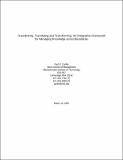Transferring, Translating and Transforming: An Integrative Framework
Author(s)
Carlile, Paul
DownloadEEL_3T.pdf (104.4Kb)
Metadata
Show full item recordAbstract
Organizations must establish processes for managing knowledge across boundaries because of the specialized and task-dependent forms of knowledge required to deliver products and services. To address this challenge an integrative framework is developed that identifies and integrates the value of different approaches to managing knowledge in organizations that are often presented as incompatible in the literature. The framework describes three progressively complex types of
boundaries: syntactic, semantic and pragmatic. Each increasingly complex boundary requires a
more complex process to facilitate communication and innovation across specialized forms of
knowledge. The framework categorizes types of boundaries, gauges their complexity, and then
describes the processes involved in managing knowledge across each of them. The development
of a new engineering tool in an automotive firm is presented to illustrate the conceptual strength
of this framework.
Date issued
2002-03-10Keywords
managing knowledge, across boundaries, task-dependent, boundaries, integrative framework, incompatible, syntactic, semantic, pragmatic, framework